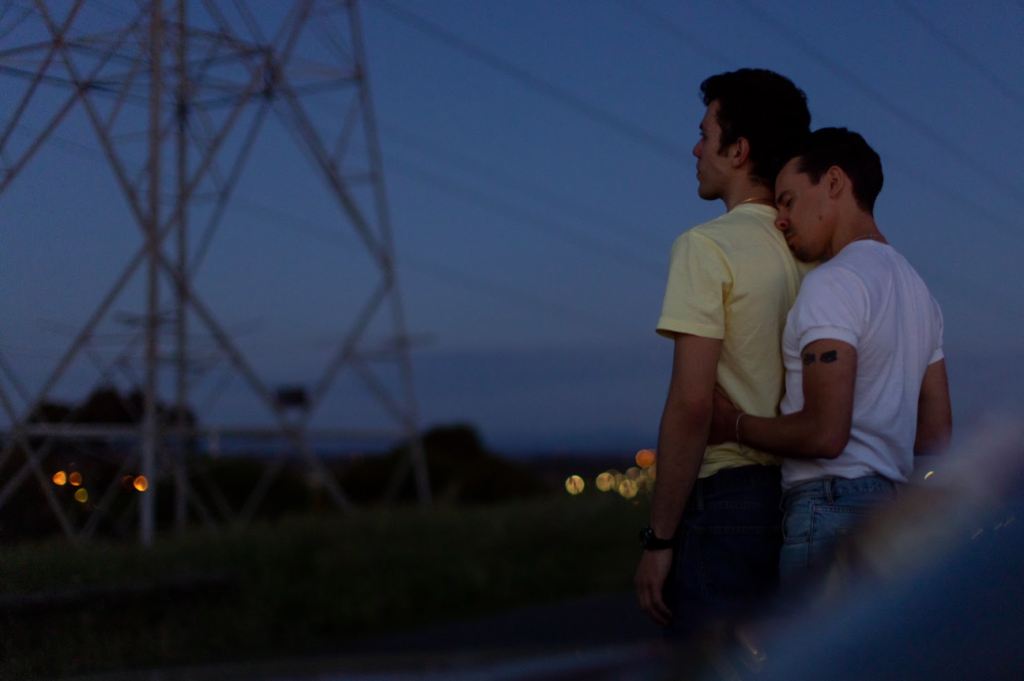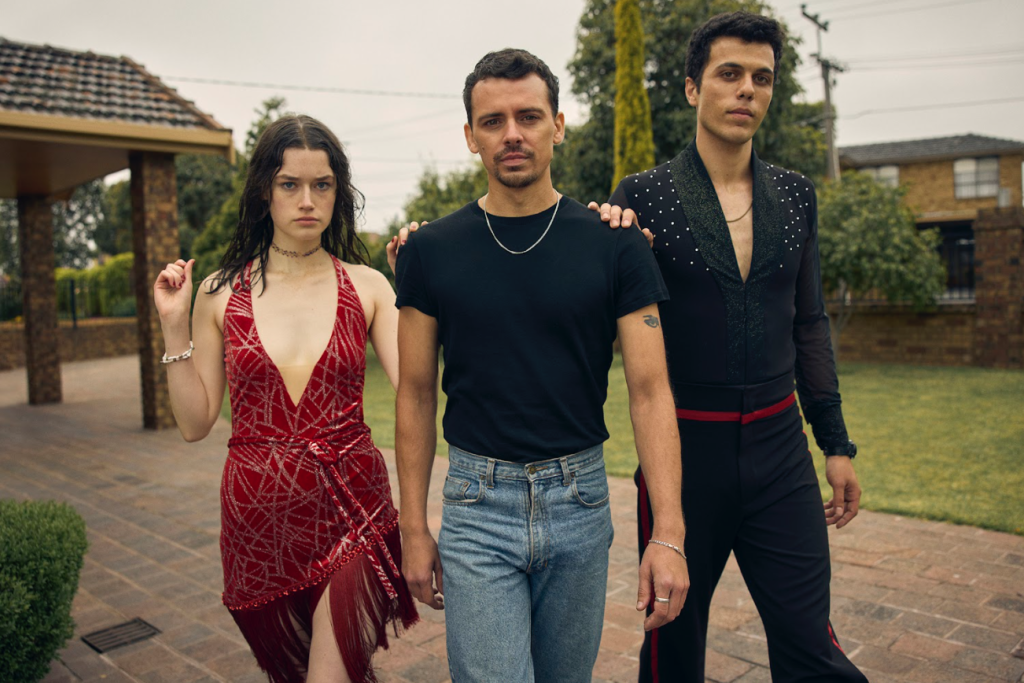By Sarah Bricker Hunt
Photos: Focus Features
“Of an Age” lingers languidly over a hot summer day in Melbourne, where practically nothing of consequence happens, except the complete implosion of main character Kol’s (Elias Anton) entire worldview and self-identity. Australian filmmaker Goran Stolevski is already winning prizes in his home country for the film, which streams on Peacock beginning April 7, and it’s easy to see why.
The movie focuses mostly on just a handful of hours, as we see 18-year-old, Serbian-native Kol (short for Nikola) meet and fall — hard — for his terrible bestie’s older brother, the more worldly Adam. It’s not much of a surprise twist for anyone but Kol; many of the film’s secondary characters assume he’s gay, and Adam clearly has an inkling from the start. But Kol hasn’t faced the facts yet, for a host of reasons, not the least of which is his deep-rooted, anti-queer immigrant family. By the end of their day and night together, he’s “come of age,” as they say. Love from this point forward will never be the same again. “Of an Age” is a little sad and quite beautiful, like many such tales.
Before seeing this latest entry in cinematic queer love stories, consider this mix of other movies focused on moments that follow queer characters as they navigate what love means to them.

‘The Perks of Being a Wallflower,’ 2012
Even the current woes of actor Ezra Miller can’t overshadow the enduring message of 2012’s “The Perks of Being a Wallflower.” The film focuses primarily on Logan Lerman’s Charlie, a teenager experiencing post-traumatic stress related to childhood molestation. But it’s a subplot involving Miller’s character, Patrick, that makes this film one of the best queer coming-of-age movies. Gorgeous, painfully earnest Patrick loves Brad, the closeted football hero. When Patrick’s father beats him after finding the two entangled in a loving embrace, Brad turns cold, Patrick suffers further physical assault from Brad’s teammates and Charlie jumps in to protect him. Ultimately, “Perks” is a story focused not just on the all-too-familiar pain of adolescent rejection within a homophobic high school culture, but on the importance of true, love-based friendship and reclaiming and actually loving the parts of ourselves that can be lost to trauma inflicted by people who are also in pain. As Charlie’s English teacher Mr. Anderson (Paul Rudd) tells him, “We accept the love we think we deserve.”
‘Moonlight,’ 2016
Few films so clearly frame the distinct eras marking a single character’s life as definitively as “Moonlight.” The film, oft-cited as one of the best films of the 21st century (period — not just in the “queer film” category), explores the main character’s life in three stages: Little (his childhood, portrayed by Alex Hibbert), Chiron (his adolescence, played by Ashton Sanders) and Black (his adulthood, portrayed by Trevante Rhodes). Throughout each stage, we see Little/Chiron/Black wrestle with the very real repercussions of being a queer Black boy and, later, man. Love looks an awful lot like pain throughout. Still, at the heart of it is his true self, which exists no matter how far he tries to run from it. In Act 2, Chiron has a sexual encounter with Kevin, who later hurts him immeasurably (physically and emotionally), but love, as it so often does, endures, even when we try to wish it away. When Kevin reappears in Act 3, everything has changed, but as is so often the case in life, “wherever you go, there you are.” Black reveals that he’s never touched another man besides Kevin and while Kevin is shocked to learn about Black’s life experiences, it’s clear that the love between the two has only grown during their years apart.
‘Love, Simon,’ 2018
“Love, Simon” broke new ground as the first mainstream queer-centered rom-com to hit the big screen. By most accounts, the movie managed to maintain its charm while ticking all the expected rom and com boxes — we all knew what would probably happen within the first 15 minutes, but you couldn’t help but root for sweet Simon Spier, played by Nick Robinson. Simon is a high schooler living in the closet but, in a distinctly modern twist, has fallen in love with an anonymous stranger online. When a fellow classmate outs Simon, the moment pulls the audience out of its rom-com coma for a moment, and it’s that unexpected jolt of awkwardness that saves “Love, Simon” from fading into formulaic obscurity. Instead of playing it safe and keeping Simon’s pain on the surface, the film gets unexpectedly dark for a minute, forcing the audience to remember that this is a queer romance with accompanying challenges that just didn’t pop up in your typical ’90s Meg Ryan vehicle. Simon’s true despair in the moment when he realizes he won’t have control over his own outing makes his big kiss on the Ferris wheel that much sweeter.

‘Booksmart,’ 2019
In some ways, “Booksmart” may be the polar opposite of “Of an Age.” While the leads are whip-smart teens headed for the Ivy League, the film is more Judd Apatow than Ingmar Bergman, brimming with high school hijinks, binge drinking (and the ensuing ill-timed, iller-placed vomit) and random make-out sessions. But there’s substance here, too, and it’s Kaitlyn Dever’s lesbian character Amy that turns this one into a meaningful story about queer love between best friends. Amy’s queerness is baked into the plot, a refreshing and realistic portrayal against a seemingly modern high school backdrop. No one’s screaming “dyke” at her in the hall, but at the same time, no one seems to really know her, either. Partly, it’s because she’s been living in the shadow of her boisterously loving straight bestie, Beanie Feldstein’s Molly. The exploration of this relationship is at the heart of the film. Sometimes, the most loving thing to do for yourself and, even for the one you love the most, is to break free from what’s comfortable and familiar to make space to discover who you really are.
‘Ammonite,’ 2020
You could consider “Ammonite,” loosely based on historical fact, a kind of later-in-life coming-of-age story. After all, the leads, brilliantly portrayed by powerhouse actors Kate Winslet and Saoirse Ronan, are full-grown women, but for Ronan’s character, Charlotte, a queer romance is altogether new. In fact, it’s not something she likely ever expected to experience in the 1840s, when the film is set. It’s certainly not what her husband, geologist Roderick Murchison (played by James McArdle) expects when he delivers Charlotte, who is suffering from “melancholy,” to the doorstep of a fellow geologist, Winslet’s Mary Anning. Perhaps Anning can perk up Charlotte’s mood with some time in the fresh air… As the two women enjoy a whole lot more than fresh air and digging up old rocks, Charlotte comes alive, as we all tend to do when offered the chance to live as our full, real selves. Did Roderick suspect all along? Perhaps not, but maybe his most loving act was giving Charlotte the freedom to truly live, if only for a moment in time.



